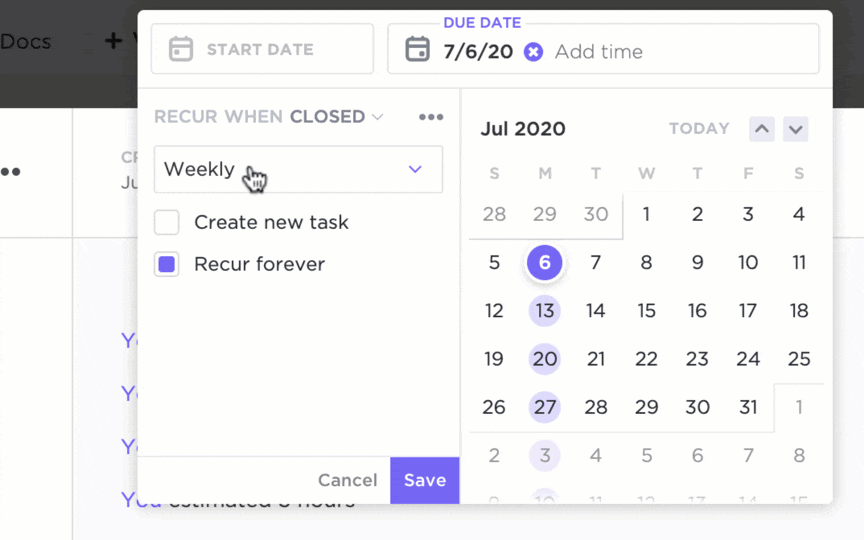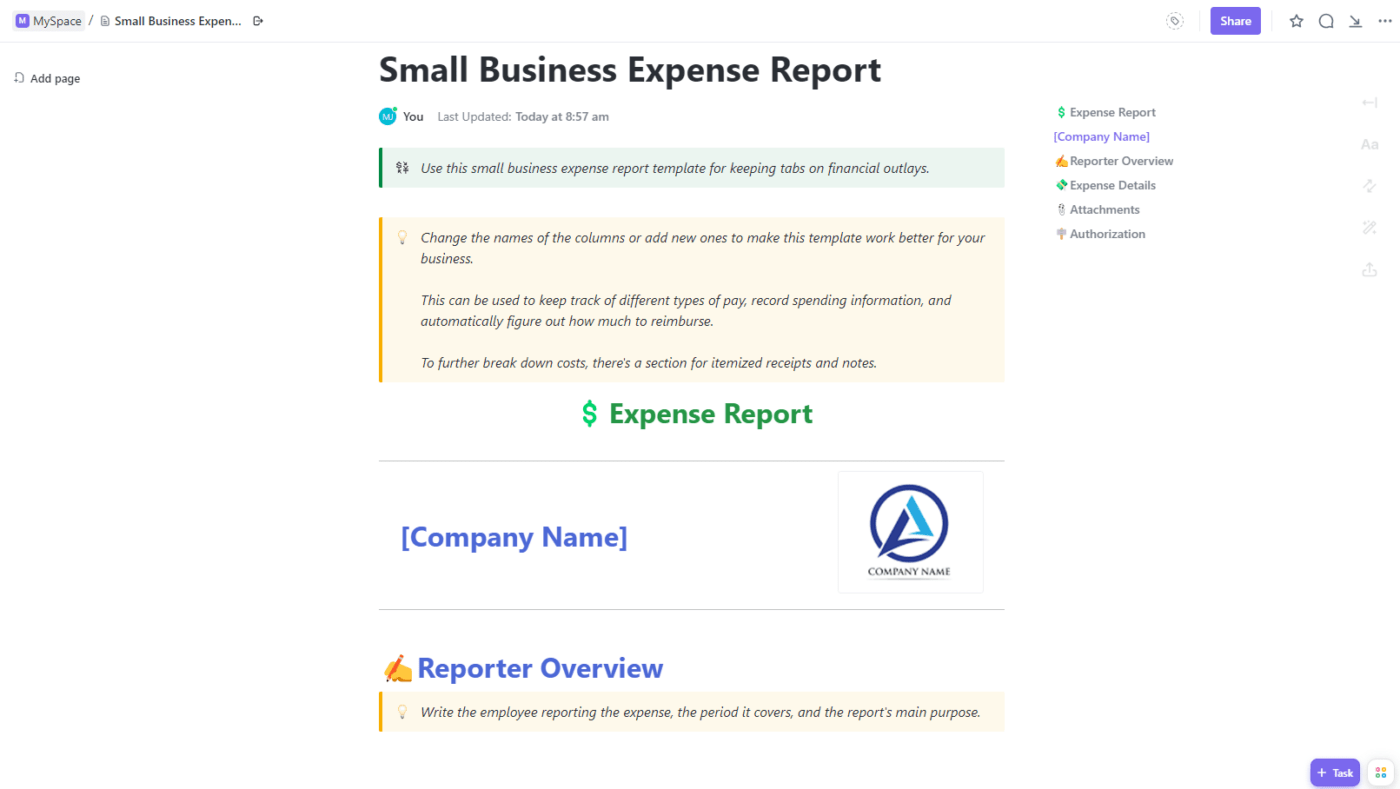How to Organize Finances: A Step-by-Step Guide

Sorry, there were no results found for “”
Sorry, there were no results found for “”
Sorry, there were no results found for “”
Are you overwhelmed by a pile of receipts, bills, and bank statements? If the answer is yes, you’re not alone.
A well-structured financial plan can help. It can increase savings, reduce debts, and bring the peace of mind that comes with knowing you’re financially prepared for life’s curveballs.
Of course, to most of us, making a financial plan sounds about as fun as folding laundry on a Sunday afternoon. So, if you’re wondering how to organize your finances and achieve financial stability, we’re here to make it easy.
Read on for a step-by-step guide to tracking your spending, setting budgets, saving money, and reaching your financial goals.
Organizing your personal finances involves managing your money, expenses, savings, and investments.
On the other hand, small business finances involve managing cash flow, payroll, inventory, and operational expenses. It also includes navigating tax obligations, regulatory compliance, and alternative financing options.
In both cases, you focus on organizing finances and managing money for a single or relatively small group of individuals. You’re also typically dealing with fewer and less complex financial documents.
Ultimately, your goal as a small business owner or individual is to reduce expenses and save money, whether that’s through business profits or increased earnings.
💡 Pro Tip for Small Businesses: Don’t just manage today’s numbers; compare them against last year. Use ClickUp’s free Year-Over-Year Growth Calculator to measure year-over-year financial performance and make sure your business is moving in the right direction
However, while these two have many common points, some unique challenges make them quite different. Let’s discuss.
| Challenges | Personal Finance | Small Business Finance |
|---|---|---|
| Balancing incoming and outgoing | The challenge in personal finance is ensuring your expenses are well below your income, and you’re putting money aside for emergencies and investments | In small businesses, the challenge is to be efficient in revenue generation and optimize expenses to ensure operational efficiency, growth, and sustainability |
| Budgets and saving | Personal financial management typically focuses on budgeting to control spending, saving for emergencies, and investing for long-term financial security | Small businesses must budget well, considering expected income over a period. The challenges are expense management, project accounting, and budgeting for departments like IT and marketing budgeting, etc., to balance costs while ensuring results |
| Income stability | Income sources are typically stable but can fluctuate due to job changes, promotions, or periods of unemployment | Small business income is complex due to the ups and downs of running a small business, sales slowdowns, competition, and other external factors. |
| Taxation | As an individual, you have to pay income tax according to the laws of your state or country. The challenge is to ensure all your financial paperwork is up-to-date, and the requisite taxes are paid on time | Businesses need accurate financial records for tax filings, audits, projects, and compliance with regulatory requirements, including employment laws and industry-specific regulations |
| Debt management | Individuals manage personal debts such as mortgages, student loans, credit cards, and personal loans, balancing repayments with savings goals | Small businesses often require external funding through loans, investors, or crowdfunding to start or expand operations. This makes the careful management of debt and equity critical |
| Investment strategies | Personal investment strategies often prioritize diversification to spread risk across assets like stocks, bonds, mutual funds, and real estate | Small businesses consider investment as part of their future planning. This could include decisions around investing in expansion, mergers, acquisitions, brand enhancement, etc. |
Now that you understand the complexities of personal financial management and managing the finances of a small business, let’s discuss the key strategies to make these processes more efficient.
ClickUp is a financial management and productivity software that helps you organize your bills and finances in an easy-to-understand manner, whether you’re managing individual or small business finances.

From tracking your finances to getting reminders of due dates, ClickUp for Financial Management lets you do all this and more. Here’s how you can use it to manage your bill payments, credit card payments, discretionary spending, and all your other financial and savings goals.


Arnold Rogers, Customer Support Manager at Launch Control, has this to say about ClickUp:
We have integrated with Intercom, Stripe, ChurnZero, Slack, Gmail, ProfitWell, etc. This enables us to track finances, retention, reporting, and customer details in one space, as we can pull information from all the tools we use and compile it in ClickUp for ease of use without getting all departments involved and taking time from their schedules.
Pro Tip: Leverage ClickUp’s Financial Management Template to track and monitor budgets, analyze financial performance, and collaborate with your team for financial planning. The template offers 28 custom statuses to keep track of financial projects. Use this template to gain control of your finances by:
The first step in organizing finances—personal or business—is budgeting. A budget is simply a written plan where you allocate your money to different expenses. It helps you identify where your money is going each month and cut down on unnecessary costs.
Making the budget, however, is just the beginning. Reviewing and updating it regularly is essential to ensure it reflects your income, expenses, and financial goals. You will find that your budget needs tweaking during certain time periods. Over time, you can identify these spending patterns and update the budget accordingly.
Regular review helps you see if you’ve gone over budget and make the adjustments accordingly. If your income has increased or decreased, adjust your budget to reflect your current financial reality. Likewise, if you’ve incurred new expenses or managed to reduce existing ones, update your budget to accommodate these changes.
If you are confused about how to begin personal budgeting, use monthly budget templates like ClickUp’s Personal Budget Template. The template helps you identify spending patterns, plan long-term goals, adjust your budget, and prepare for unexpected expenses. You can see your budget by category and check due dates using ClickUp’s Calendar View.
Project budget templates like the ClickUp Business Budget Template can simplify the budgeting process for small businesses. The template lets you create project budgets and a filing system with detailed breakdowns to centralize your business expenses and track actual performance against planned performance. With this template, you can see results compared to plans in real-time, spot areas to optimize, and cut costs.
You have dozens of bills to pay every month—utility bills, rent, mortgage, credit card, subscriptions, salaries, and more
Paying your bills on time is critical to keeping your household or business running and ensuring you become—and stay—debt-free. This can become a challenge when you have bills that are due at different times, there’s variation in the amount due, and you have to ensure that you have enough funds to make timely payments.
Paying on time helps you avoid late fees, maintain a good credit score, and manage your cash flow effectively.
Tips to help you remember to pay bills on time:
The next step is tracking your spending to know where your money goes. Tracking helps you:
Here’s how you can track your expenses:

If you have a joint account, it is crucial to balance it regularly to maintain transparency, trust, and financial harmony with your co-holder. Depending on the number of people in the joint account and the authority they have to make transactions, balancing joint accounts can become a challenge.
Here’s how you can balance joint accounts:
It helps in accurate budgeting and financial planning, as all account holders can see where their money is going and adjust their spending accordingly.
It also helps prevent overdraft fees and associated expenses, which can occur if one account holder is unaware of pending transactions.
Savings are essential. The best way to save is to set clear goals; whether you’re saving for retirement or buying a new home, having a goal gives you direction, motivation, and a clear roadmap.
Here’s how you can set and achieve your savings goals:
Directly depositing your paychecks is a convenient and efficient way to manage your income. It ensures that your earnings are quickly and securely deposited into your bank account. There are many benefits:
To set up direct deposit paychecks, contact your HR or payroll department and verify with your bank that they can accept direct deposits. The next step is to enable automatic transfers to allocate funds to different accounts, such as emergencies, retirement, or investments.
Thanks to technology, you don’t have to organize your finances manually. Financial apps are game changers in finance. They help you manage your personal or small business finances from anywhere in the world.
Most apps have features that let you track expenses, set reminders, create budgets, pay bills, and monitor investments. Here are some benefits of using financial apps:
While selecting a financial app, carefully go through its features. Check whether the app has strong security standards and whether customers find the app useful.
Effective credit card management helps maintain financial health, avoid debt, and maximize benefits. It also lets you take advantage of rewards, improve your credit score, and ensure you stay within your budget.
Some ways of incorporating credit card management into financial management are:
The ‘debt snowball’ method is an effective way of systematically eliminating your debts. It focuses on paying off smaller debts first to build momentum and motivation. To use this method, follow these steps:
As you pay off each debt, the amount you can allocate towards the next debt increases. This snowball effect allows you to pay off larger debts more quickly.
This method can be an effective way to become debt-free, and you feel a sense of accomplishment every time you pay off a debt. It also allows you to focus on one debt at a time without feeling overwhelmed.
Looking for a comprehensive tool to supercharge your small business finance management? Read our comprehensive guide on how to use ClickUp to grow your small business for free!
Organizing your finances may seem tedious and daunting, but the benefits are well worth the effort. Regularly reviewing your budget, paying your bills on time, balancing joint accounts, and tracking your spending can help you lead a healthy, secure, and stress-free financial life.
Remember, organizing your finances isn’t a one-time event. It is a continuous process. So start small, stay consistent, and celebrate your progress.
Take a proactive approach and leverage a tool like ClickUp to gain control over your finances. Sign up for free today!
© 2026 ClickUp